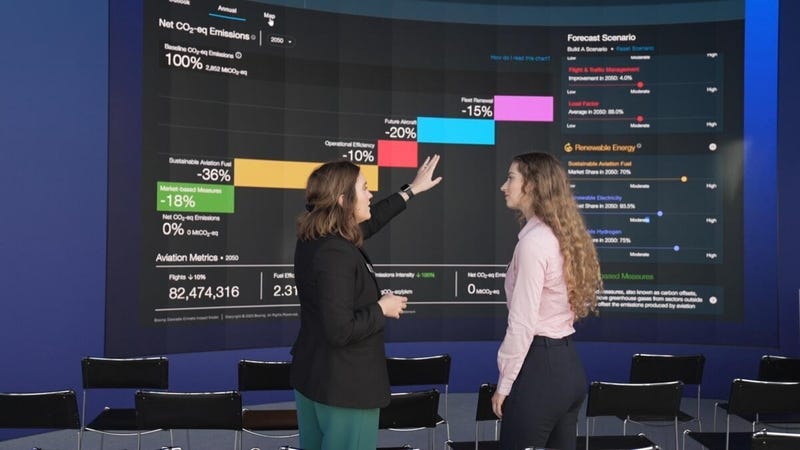How Boeing's sustainability approach leverages local expertise for global impact
Interview with Ryan Faucett, Boeing VP for Environmental Sustainability at Sustainable Aviation Futures Congress MENA, Abu Dhabi.
At the Sustainable Aviation Futures Congress MENA in Abu Dhabi, there’s a palpable energy in the air. The doomsday predictions about the future of sustainability – especially under the Trump administration – have clearly not travelled till the Middle East. There’s hope, optimism and belief that the inevitable shift towards a cleaner energy future is inevitable.
And why shouldn’t there be? The one constant refrain at the conference has been the immense potential of the region to generate renewable energy and, potentially, green hydrogen. That’s not all, most attendees are firmly convinced that the region is unparalleled in its access to plentiful human and financial capital.
On the sidelines of the conference, we caught up with Ryan Faucett, Boeing's Vice President of Environmental Sustainability. He shared insights into how the aerospace giant is reshaping its approach to decarbonisation through a globally distributed network of sustainability teams.
A global approach to sustainability
Three years ago, Boeing established its first sustainability office, initially concentrated around its US headquarters. "As it happens sometimes, when you form something new in the centre, the first kind of version of that organisation is generally based where the headquarters or where the major sites are for that company," Faucett explains.
Today, the company maintains 13 regional sustainability offices with a presence across three main regions: Asia Pacific, with teams in Japan, India, Singapore, and Australia; Europe, Middle East, and Africa, with representatives across European nations and Dubai; and the Americas, spanning from Canada to Brazil.
"I think we were pulled naturally that direction by our customers," explains Faucett. "You have to be here to really understand from our perspective what's happening, what challenges we might be having with the government to make progress," he adds, recalling their feedback.
"Only when we finally shifted to having folks really in those locales, working right alongside our broader global offices, but wearing the sustainability hat... could we actually look through the eyes of our customer."
Challenges and opportunities in the Middle East
The Middle East presents a unique landscape for aviation sustainability. A Boeing study conducted in partnership with the UAE Department of Energy and the World Economic Forum a couple of years ago revealed significant potential for sustainable aviation fuel (SAF) production in the region, particularly through power-to-liquid pathways utilising solar energy. Faucett adds that this transition could create significant employment opportunities in the region.
However, he identifies a crucial challenge: despite the region's abundant capital, the aviation industry hasn't effectively articulated why this capital should be directed towards sustainable aviation.
"What's unique about the Middle East is there's obviously access to capital here," he explains. "But what I think the aviation industry here hasn't done a good enough job is articulating why that capital should go towards aviation... and not just expansion of, say, Dubai Airport."
The importance of knowledge sharing
The region faces immediate challenges, particularly regarding European Union regulations. Boeing's global experience proves valuable here, as Faucett notes: "We're actually a global company ourselves that we have obligations in Europe on things like CSRD or future climate risk. So we have perspectives to share and our airlines like to hear about that." This knowledge-sharing has become a value-added service for airline partners navigating new regulatory landscapes.
While several SAF projects have been announced in the region, actual production remains limited. Faucett points to a significant milestone: Boeing's involvement in one of the region's first SAF facilities, the SBRC project, which successfully produced fuel that Etihad used in 2019. However, he identifies a crucial gap in the region's SAF development: "What's missing, though, in this region is that infusion of capital in that moment called pre-final investment decision."
Looking ahead: tools for transformation
Boeing's commitment to sustainability extends beyond regional expansion. The company is preparing to launch Cascade 2.0, an enhanced version of its sustainability assessment tool that allows for detailed regional analysis of decarbonisation pathways. The model has found particular resonance with policymakers who are evaluating incentives and mandates for the industry's sustainable transition.
The immediate future presents both challenges and opportunities. Boeing's primary focus remains on aircraft production, particularly the fuel-efficient MAX model. "The journey to net zero, the retirement of old aircraft and the introduction of more fuel-efficient aircraft is a big lever," Faucett explains. "I think about 17% of the net zero equation can be solved just by that."
Looking ahead five years, Faucett expresses optimism about the industry's trajectory. "I think the next five years are massively exciting," he says. "Politically, it's dynamic. Like, different things happening in different parts of the world. Opportunities abound for, at the national level, differentiation to occur." He anticipates seeing countries implement creative policies to differentiate themselves in the sustainability space, while the scaling of SAF production will provide crucial indicators about the feasibility of 2050 net-zero targets.
While challenges remain, particularly in regions like the Middle East where traditional energy interests run deep, Boeing’s evolving approach suggests a more nuanced and locally attuned path toward aviation decarbonisation.
For February 2025, we’re pleased to feature 4AIR as our exclusive Sponsor of the Month. 4AIR is leading the way with the industry’s first framework to address aviation’s climate impact – offering clear, verifiable pathways to reduce and counteract emissions. Discover their services, including compliance monitoring and The Assure SAF Registry, to advance your sustainability efforts.





